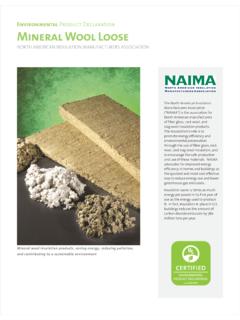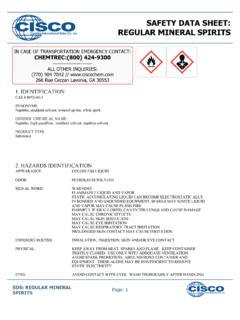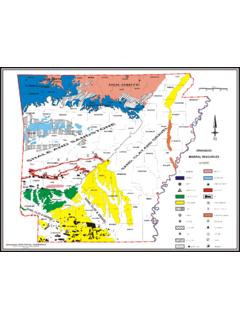Transcription of Mineral Rights - michigan.gov
1 Mineral Rights Please note: This fact sheet is intended only to give a brief general description of Mineral Rights , and is not to be construed as legal advice. If you are involved in a Mineral Rights or Mineral development matter, you may wish to contact an attorney. michigan is a significant producer of Mineral resources, ranking 16th among the states in production of crude oil and natural gas and 12th in production of nonfuel minerals, including iron ore, salt and brine extracts, sand, gravel, gypsum, and a host of other Mineral products. The Rights to develop minerals in michigan are based mainly on common law doctrines.
2 These doctrines have evolved through interpretations of Rights by the courts, and have their roots in the old English laws that we inherited. In some cases, the common law doctrines have been modified or clarified by statutes enacted by the michigan legislature. The Oil, Gas, and Minerals Division of the michigan Department of Environmental Quality regulates many aspects of Mineral extraction activities. The purpose of the regulations is to provide for orderly development of minerals while protecting natural resources, the environment, and public health and safety. However, the Rights to develop minerals, and the purchase and sale of those Rights , are private contractual matters that must be negotiated between the parties involved.
3 What are Mineral Rights ? A Mineral right is a right to extract a Mineral from the earth or to receive payment, in the form of royalty, for the extraction of minerals. Mineral may have different meanings depending on the context, and there is no universal definition. However, Mineral generally includes: Fossil fuels oil, natural gas, and coal. Metals and metal-bearing ores such as gold, copper, iron, nickel, zinc, etc. Nonmetallic minerals and mineable rock products - such as limestone, gypsum, building stone, and salt. Mineral may also include sand and gravel, peat, marl, etc. Who Owns the Mineral Rights for a Parcel of Land?
4 A Mineral right is a property right and may be sold, transferred, or leased similar to other property Rights . Mineral Rights are distinct from surface Rights , or the right to the use of the surface of the land for residential, agricultural, recreational, commercial, or other purposes. Mineral Rights may be sold or retained separately from the surface Rights , in which case the Mineral Rights are said to be severed. A person may own all of the Mineral Rights for a parcel or any fraction of the Rights . A person may also own Rights to only one kind of Mineral , such as oil and gas, or to only one formation or depth interval.
5 The ownership of the Mineral Rights in a parcel can usually be determined by examining the deed abstract for the property. Who Can Develop the Minerals in a Parcel? A Mineral owner may develop his or her own Mineral deposit. Alternatively, a Mineral owner may lease his or her Mineral Rights to a Mineral development company. By executing a lease, the Mineral owner (the lessor) grants to the person or company who receives the lease (the lessee) the right to develop and produce minerals in the leased parcel. A lease is a private contract between the two parties, and can take a variety of forms. However, leases usually have certain common elements.
6 The Mineral owner is paid an amount of money, called a bonus, when the lease is signed. The lease generally provides for payment of a royalty to the Mineral owner on any minerals produced from the parcel, and the manner in which royalty payments are to be made. Leases generally have a specific term, or duration. A lease may provide for a periodic rental payment to the Mineral owner if no minerals are produced and no royalty payments are being made. The owner or lessee of the Mineral Rights , whether severed or not, has the right to reasonable use of the land to extract minerals from the property. However, the owner of the surface Rights to a parcel may be entitled to compensation for loss of crops or timber.
7 Can Severed Mineral Rights be Retained Indefinitely? Under michigan law (Act 42 of 1963, Termination of Oil or Gas Interests in Land), severed oil or gas Rights revert to the surface owner after twenty years unless one of the following actions have occurred within the 20-year period: A drilling permit is issued. Oil or gas is actually produced or withdrawn from the severed holdings. The interest is utilized for underground gas storage operations. The severed interest is sold, leased, mortgaged, or transferred by recorded instrument. A written notice is filed with the county Register of Deeds. Act 42 of 1963 applies only to oil or gas Rights , and not to other Mineral Rights .
8 The Act exempts interests owned by a governmental body. What Happens if a Minority Owner Does Not Agree on Development of Minerals? michigan law has provisions to protect the Rights of owners or lessees of minerals in cases where not all owners of minerals in a tract agree on terms for development. Where minerals other than oil and gas are owned by more than one person or company, the owner or owners of more than 75 percent of the Mineral interests may request a court decree authorizing them to explore for and produce the minerals. For oil and gas, michigan law provides for the establishment of drilling units - a tract of land with a specified size and shape that can be efficiently drained by one well.
9 When not all owners in a drilling unit agree on oil and gas development, the owner who wishes to drill may petition the Department of Environmental Quality for an Order to pool the interests of the non-consenting owner or owners. Such Orders provide for a development plan and for allocation of costs and proceeds (see our fact sheet entitled Pooling of Properties for Oil and Gas Production ). In the case of either oil and gas or other minerals, the law provides for fair compensation to the non-consenting owner for their share of the minerals produced. Department of Environmental Quality C. Heidi Grether, Director State of michigan Rick Snyder, Governor Oil, Gas, and Minerals Division 525 W.
10 Allegan Box 30256 Lansing MI 48909-7756 517-284-6823 Updated June 2017















